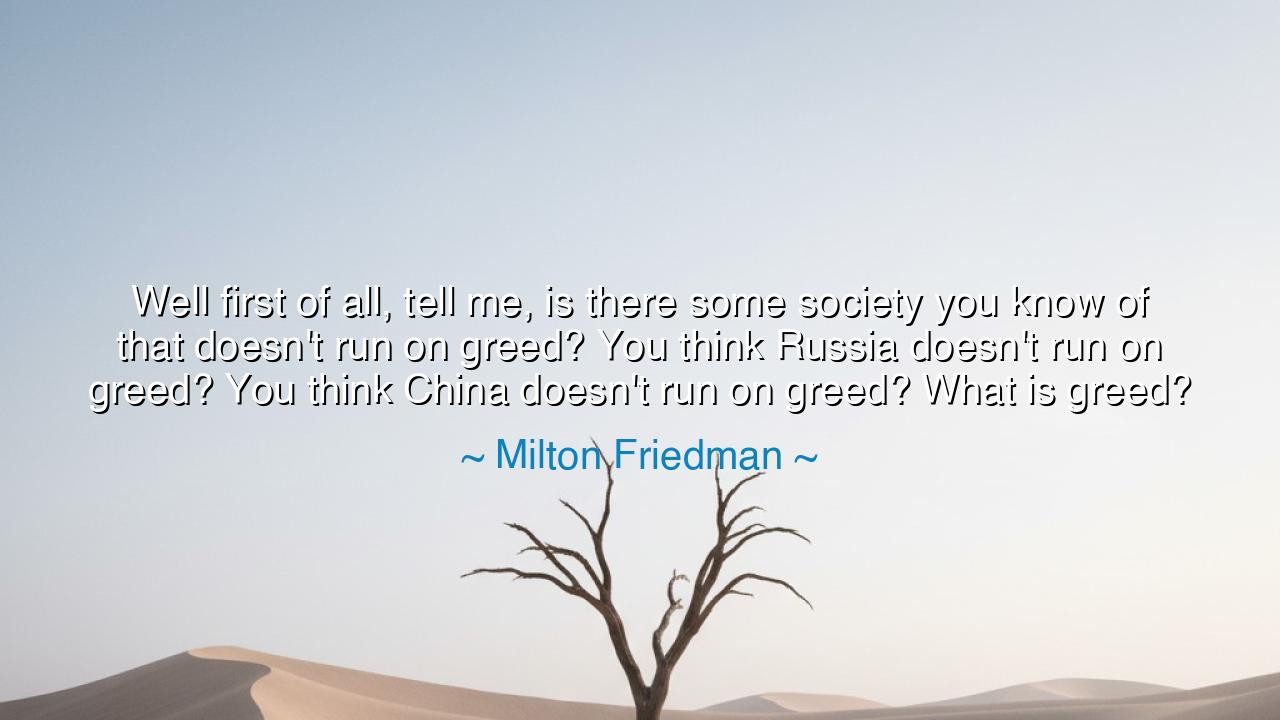
Well first of all, tell me, is there some society you know of
Well first of all, tell me, is there some society you know of that doesn't run on greed? You think Russia doesn't run on greed? You think China doesn't run on greed? What is greed?






O children of the future, gather around and hear the words of a man whose wisdom cut through the illusions of the world with sharp clarity. Milton Friedman, a thinker whose voice echoed in the halls of economics and politics, asked: "Well first of all, tell me, is there some society you know of that doesn't run on greed? You think Russia doesn't run on greed? You think China doesn't run on greed? What is greed?" These words are a challenge—a challenge to the very foundations of the systems we live under, a challenge to examine the true nature of the world in which we exist. What, indeed, is greed? And how is it that every society, no matter how it presents itself, is built upon its foundation?
In the time of the ancients, the great philosophers—Socrates, Plato, and Aristotle—spoke of the nature of man and his desires. They understood that human beings are driven by many forces, but one of the most primal is the desire for more. Greed, as they would have understood it, is not merely the craving for material wealth, but the desire for power, the need to control, and the impulse to expand beyond one’s needs. Socrates, in his dialogues, often pointed out that people are enslaved not by their wealth, but by their desires—for in desiring more, they are never at peace. Plato warned that societies corrupted by greed would fall into discord, for the pursuit of wealth leads men away from the pursuit of wisdom and virtue.
When Friedman asks whether societies like Russia or China run on greed, he is drawing attention to the inherent self-interest that governs all human endeavors, whether in democratic or authoritarian regimes. He is reminding us that, despite the different masks societies wear, the engine that drives them is not altruism, but the desire to accumulate—be it wealth, power, or influence. Whether a society claims to be built on equality, freedom, or justice, it is often the case that the self-interest of those in power shapes the system, and greed is the force that fuels it.
Take, for example, the great Roman Empire, which ruled much of the known world. While its leaders professed the ideals of law and peace, the reality was that the empire thrived on expansion, on the conquest of foreign lands, and on the exploitation of resources and people. The Roman rulers, like all those before them, were driven by greed—the greed for power and wealth that comes from dominating others. They built their empire not for the love of mankind, but for the advancement of their own interests, using the pretense of order to justify their acts of exploitation. The history of Rome is a history of greed, hidden beneath the rhetoric of empire and civilization.
In our own time, we see the same forces at play. Nations across the globe, from the United States to China to Russia, while they may espouse ideals of freedom, equality, or revolution, all operate within a framework that ultimately serves the interests of the few. The rich grow richer, the powerful grow more powerful, and the masses—though promised justice and fairness—are often left behind, their needs subordinated to the interests of those at the top. Greed manifests itself in the desire to maintain power at any cost—whether through capitalism, socialism, or authoritarianism. The self-interest that underpins these systems is the same, regardless of the political or economic model.
But Friedman’s challenge is not one of cynicism; it is one of truth. He urges us to acknowledge that greed is not merely the curse of one type of government or one type of society, but a universal force—one that shapes all human systems. To deny this is to live in illusion, for no society, no matter how noble its intentions, is free from the desires of the human heart. The lesson here is that understanding this truth is the first step toward transformation. By recognizing the presence of greed, we can begin to address the systems that perpetuate it, not through idealism, but through practical change.
The true challenge, then, is not to reject society as inherently corrupt, but to strive to shape it in ways that minimize the harm caused by greed. Friedman’s words urge us to engage with the world as it is, not as we wish it to be. The path forward requires us to confront our own desires and to build systems that counterbalance the innate tendencies of greed. It is through the careful and deliberate construction of societies that embrace equality, justice, and accountability that we can hope to reduce the impact of greed on the many.
And so, O children, take these lessons with you. The world you inherit will be shaped by the same forces of greed that have shaped the world before you. But you must not allow this to be a cause for despair. Use the awareness of greed to guide your decisions, to question systems that seem unjust, and to build communities where self-interest does not overshadow the common good. Strive to cultivate within yourselves a love for wisdom, for compassion, and for the truth, so that when greed threatens to dominate, you will be able to stand firm and seek a higher path—one that serves the whole and not just the self.






AAdministratorAdministrator
Welcome, honored guests. Please leave a comment, we will respond soon